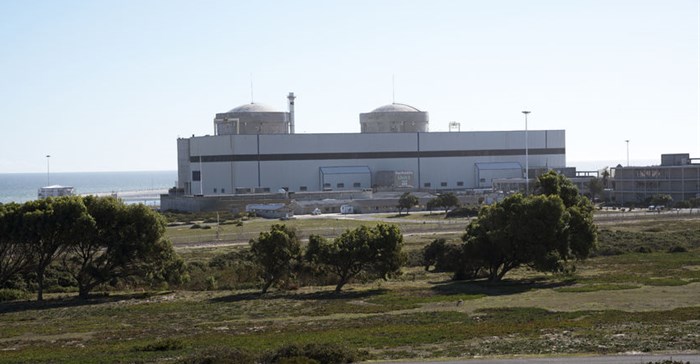
Subscribe & Follow
Advertise your job vacancies
#AUW2016: How nuclear build programmes can be a strategic game changer
A while back, South Africans reeled in shock when a rand figure of trillions was mentioned in the same breath as nuclear power. Whether it was the astronomical amount of money, the atomic fear factor, or even the subsequent hype in the media, the government appears to have toned down its nuclear-build aspirations.

South Africa's only existing nuclear power station, Koeberg, north of Cape Town. © Peter Titmuss 123RF.com
It seems the mega nuclear power plant that was speculated about a few months ago has been shelved, in favour of other options. A programme similar to the French fleet system, or reverting to the pebble-bed option mooted in the past, were mentioned by several speakers at African Utility Week (AUW).
At the one-day Nuclear Power Africa event, a sidebar to AUW, one of the panel discussions focused on, among other things, the cost of funding and financing of a new-build project.
The investment case for nuclear
The moderator, Anurag Gupta, director: global sector head for power, KPMG, said, “The investment case for nuclear is tough, and lots of things have to fall into place regarding funding and financing. This includes the size and complexity of the project, licencing, planning, decommissioning and political risk.”
It’s also difficult to attract investors for a one-plant project, they would rather look at a programme. In many instances, it’s not just building the plant that needs to be considered, but also the supporting infrastructure such as ports and roads. The role of government is also critical, and cross-party political support gives investors confidence.
He went on to explain the difference between funding and financing. The former refers to who will pay for the electricity cost recovery, whether the market will support the long-term electricity price and revenue. While financing applies to how the developers go about raising money.
Global overview
“No nuclear-build project is the same, and they depend on a mix of technological choices, jurisdiction and outcomes,” said Irina Manina, project director, Rosatom, Russia.
From an international perspective of the 87 nuclear projects instigated since 1995, 17 were commissioned by Rosatom. “There needs to be the right planning from the very beginning and the country has to be new-build ready in terms of its legislation, which needs to be standardised to meet global safety regulations,” she explained.
Local perspective
Whatever the technology, the powers-that-be have assigned 9,600MW to nuclear in the country’s energy mix, which has raised the question whether we need that much additional power.
Dr Anthonie Cilliers, programme manager, nuclear engineering, North-West University, said the discussion shouldn’t revolve around whether South Africa needs 9,600MW. “The moment you think you don’t really need it, you create uncertainty among potential investors. We need to look at what 9,600MW will do for our GDP and economic growth. This project could be real investment in South Africa, and one of the requirements will be local skills development."
“A request for proposal is out to see what the costs are. If it turns out to be too expensive we’ll make another plan. Only then can we look at financing and funding,” he said.

About Nicci Botha
Nicci Botha has been wordsmithing for more than 20 years, covering just about every subject under the sun and then some. She's strung together words on sustainable development, maritime matters, mining, marketing, medical, lifestyle... and that elixir of life - chocolate. Nicci has worked for local and international media houses including Primedia, Caxton, Lloyd's and Reuters. Her new passion is digital media.Related
Mantashe adds Russia and Iran to nuclear chat 19 Feb 2025 #BRICS2024: Inside the plan to harness nuclear power for sustainable growth 25 Oct 2024 Egypt will benefit from floating nuclear plant 11 Jun 2024 Tiger Brands sees no respite from high food prices yet for consumers 5 Dec 2023 #EnlitAfrica2023: Tackling the toughest questions around nuclear power in SA 18 May 2023








